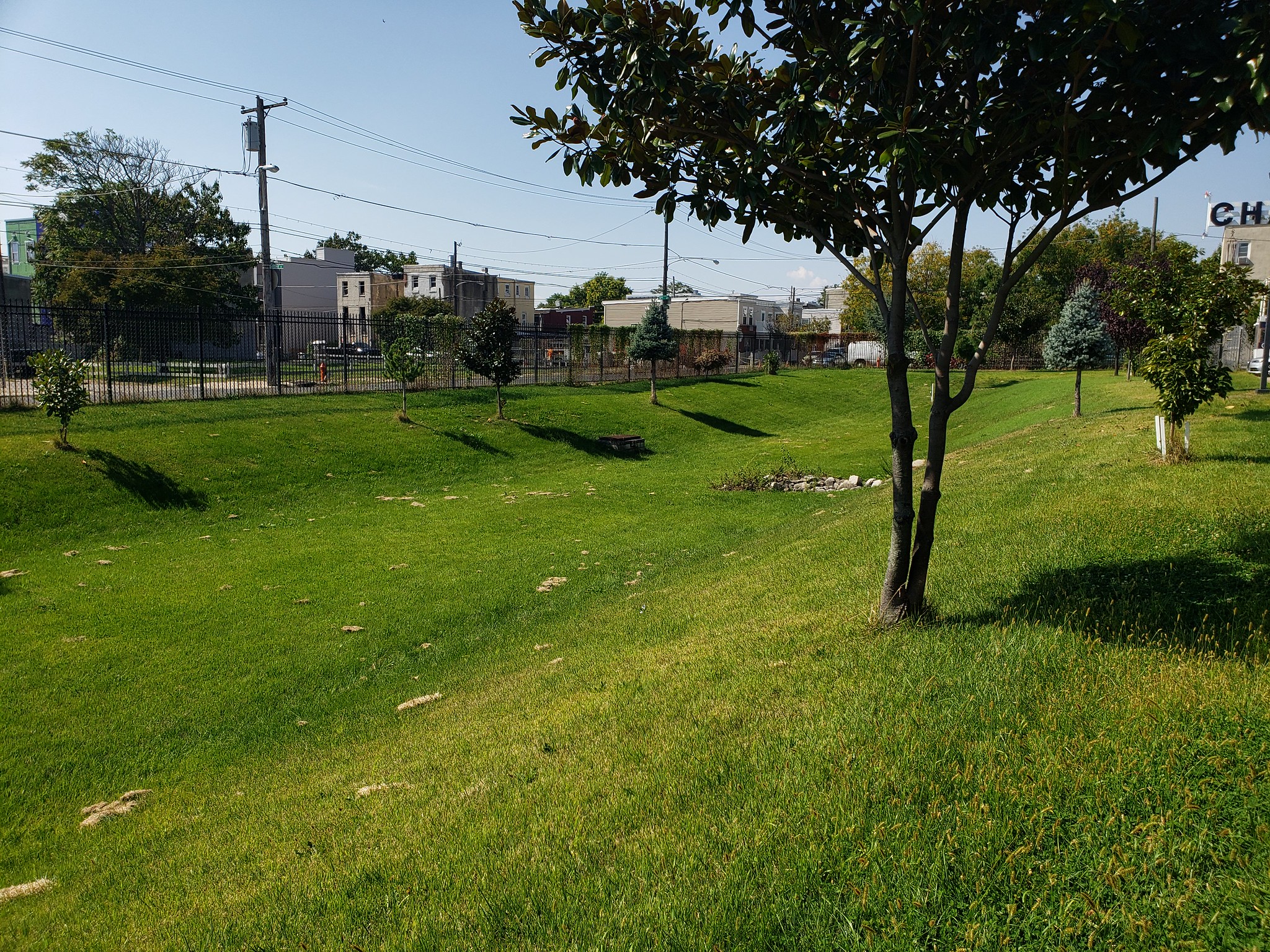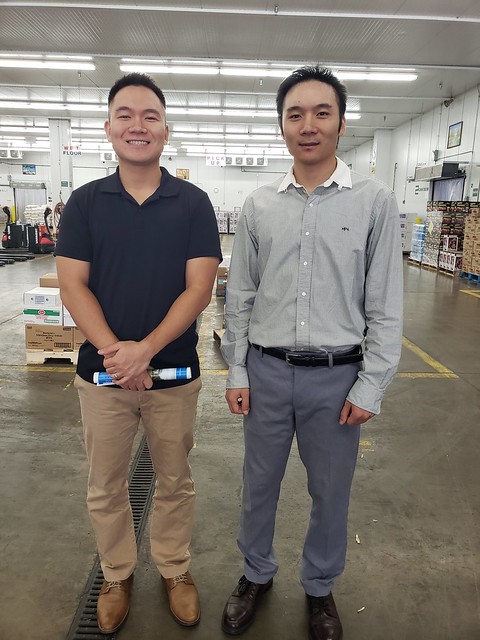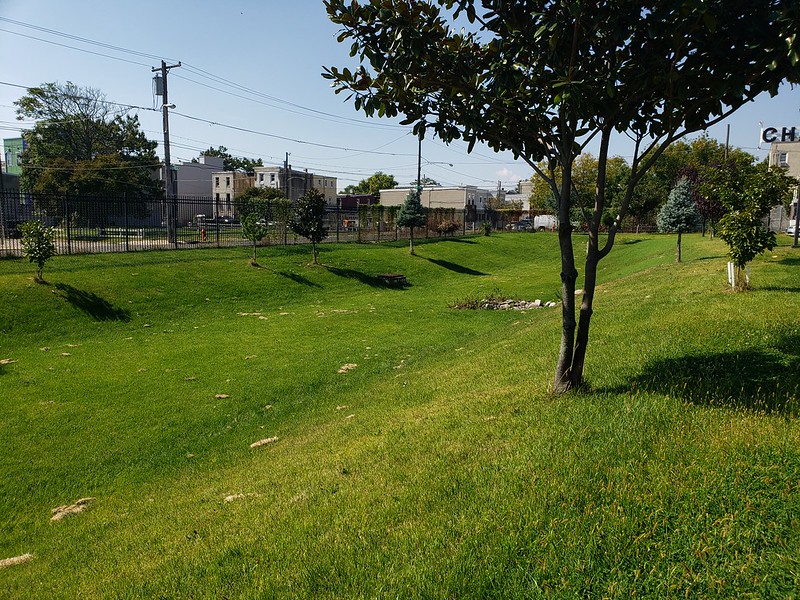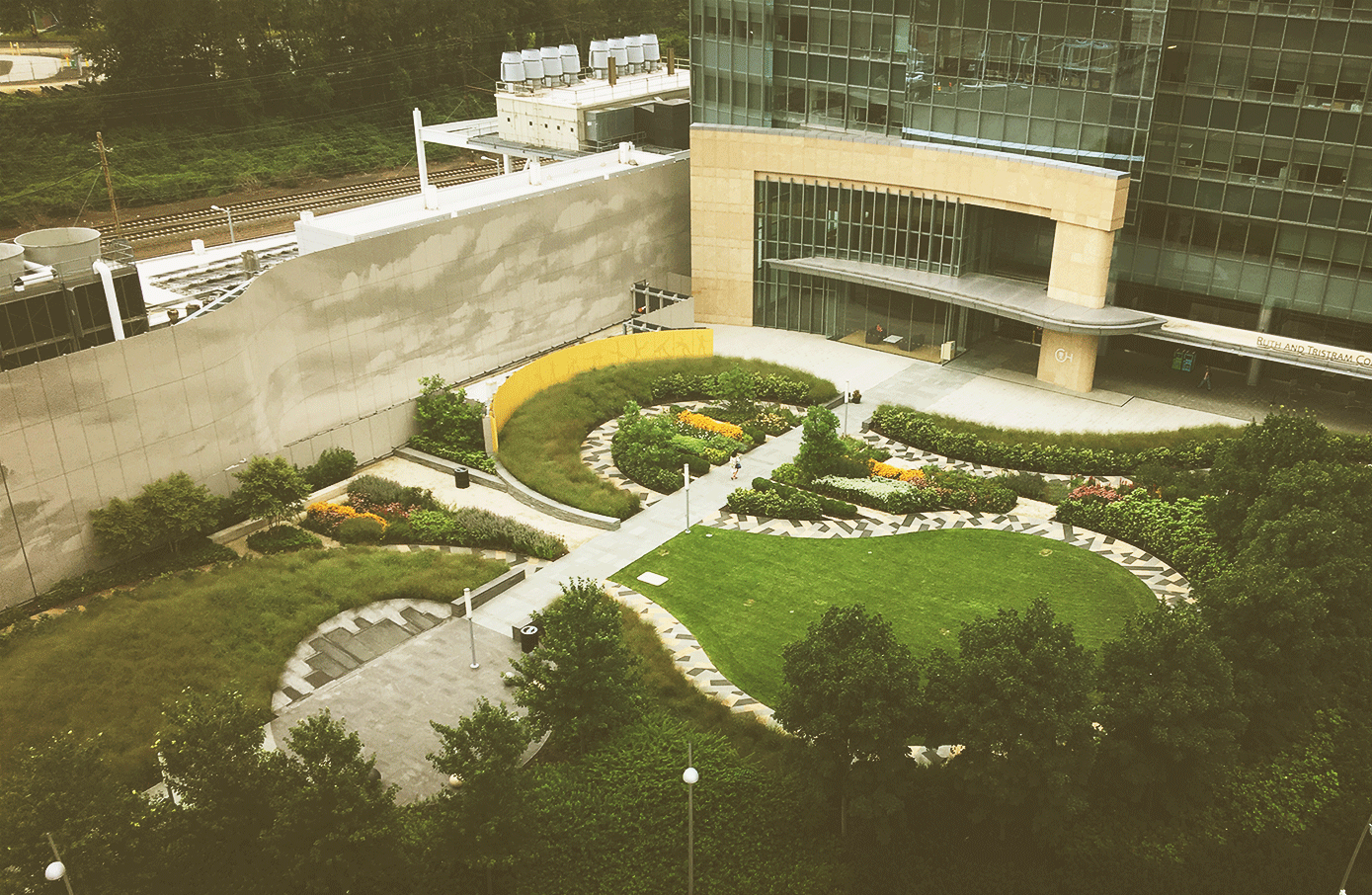The Stormwater Pioneers award is our way of showcasing innovation, excellence, and the ability to overcome technical challenges. The 2020 award honorees are recognized for excellent maintenance of stormwater infrastructure on their properties.
This year’s honorees include Chaes Food, a North Philadelphia-based commercial distributor, and Birchwood at Cedars Village, a South Philadelphia-based senior living community.
The Chaes Food Property: an Oasis in North Philly.
Chaes Food, which distributes niche frozen foods, dairy products, and packaged goods, operates at a 50,000-square foot facility on 2100 American Street—putting them on a corridor that is also the focus of a major public green investment project.
The building was constructed in 2008 with the City’s recently adopted stormwater regulations, which require developers to create systems that manage runoff on-site, in mind. With less than 40 employees, the family-owned company is led by father Tony Chae with help from his sons, Young and Jeff.
Chaes Food understands that maintenance is essential to ensure long-term performance for privately-owned stormwater management tools.
Routine maintenance isn’t just important for ensuring a property’s green tools manage stormwater and protect our waterways: it also helps the company avoid potentially costly infrastructure repairs that can be necessary when systems aren’t properly cared for.
Bioinfiltration Basin
Chaes Food constructed a bioinfiltration basin, green tools more commonly referred to as rain gardens, which allows water from the property’s impervious surfaces to filter through vegetation and a soil medium. This system helps to continue the natural hydrologic cycle.
At PWD, we encourage surface-based bioinfiltration practices because maintenance can largely be performed by property owners or general maintenance companies. Often, more traditional subsurface systems require a certified maintenance professional.
There are two general bioinfiltration options: Grass-based systems that can be mowed and planted systems, which act more like gardens and require weeding. Chaes uses a grass-based system.
Both styles have the benefit of increasing urban green spaces and promoting natural cycles that speed up stormwater elimination, but planted systems can provide a greater variety of species that support pollinators like butterflies.
A Variety of Tree Species
Chaes Food was smart in its selection of a landscape palette that was suitable for its business operations. This is evident by the well-maintained and healthy vegetation in and around their bioinfiltration basin. A bonus is the variety of tree species planted, including dogwood, pine, and magnolia trees, which attractively frame the basin and other parts of the property. The Chaes family takes great pride in the plantings and their maintenance.
“We really want to have a positive impact on our neighborhood,” said Young Chae.
Why Chaes Food Is a Stormwater Pioneer
During compliance inspections of Chaes Food—visits we make to all private sites with required stormwater management systems—the biofiltration basins, inlets, outlet control structures, and system piping were all found to be clean and free of sediment and trash build-up.
Further, the property’s bioretention basin has stabilizing grass growth, and there is no visible sign of erosion on the sides of the basin. Stormwater enters the basin through a large endwall with a big stone apron that dissipates the stormwater runoff. The apron’s stone is still firmly in place—another sign of proper maintenance.
Regular maintenance of green tools is essential to ensuring that stormwater runoff can filter through the soil and infiltrate into the ground. Filtering of the water through soil and plants helps to remove pollutants and improve the quality of stormwater runoff.
The long-term success of stormwater management relies greatly on maintenance. The owners at Chaes Food have taken this to heart with their generous displays of a variety of tree species, clean SMP components, and well-maintained vegetation.
Cedars Village: Providing Residents with Green Perks
Cedars Village, a 64-unit, five-story development, is home to restricted-income residents over the age of 55.
Located at 921-931 Ellsworth Street, it was completed in 2014 through the combined efforts of the nearby St. Maron Community Development Corporation, BCM Affordable Housing, and the Cedars Village property manager Ingerman Affordable Housing. Cedars Village is a great example of how stormwater management can be restored to a fully-functioning status if construction issues persist or maintenance lapses.
PWD promotes an integrated design approach to build stormwater management solutions that protect receiving waters in a cost-effective manner. To meet PWD’s stormwater regulations, Cedars Village developed a series of stormwater management methods, including a green roof, permeable concrete pavers in the central courtyard, and subsurface infiltration and detention basins.
It Started with Corrective Action
We periodically inspect completed private development projects to ensure green tools are still functioning and being properly maintained. In 2018, a routine inspection of Cedars Village yielded several items for the property to address, including:
- Cross connections with the building’s stormwater and sewer lines
- Large areas of the green roof lacking vegetation
- Debris, sediment, and trash found in inlets and outlet controls (structures that control the rate at which stormwater exits the basin)
- Loose stones around the permeable concrete pavers in the courtyard
Why Cedar’s Village Is a Stormwater Pioneer
Property managers quickly moved to become compliant by addressing concerns and completing the following tasks:
- Reconfiguring sanitary laterals to address the cross connection issue, allowing them to connect directly to the sewer in the street instead of the infiltration basin.
- Replanting barren green roof areas
- Educating residents about the importance of not walking on the vegetation
- Removing deck furniture from planted areas
- Manual cleaning of existing debris
- Reinforcing manholes and inserting pre-treatment devices (snouts, trash racks, and traps) to prevent future debris accumulation over vital components of the green tools
- Sweeping loose stones from the permeable pavers.
Cedars Village recognized the necessity of developing a maintenance plan for their stormwater management tools moving forward.
For instance, starting this spring and summer, the green roof’s weekly maintenance plan includes weeding, keeping the drainage areas clear of plants, watering regularly during the growing season, and monitoring vegetation for pests and disease. A detailed maintenance log will be kept moving forward, ensuring continued maintenance, which allows these green tools to function at maximum efficiency for years to come.










